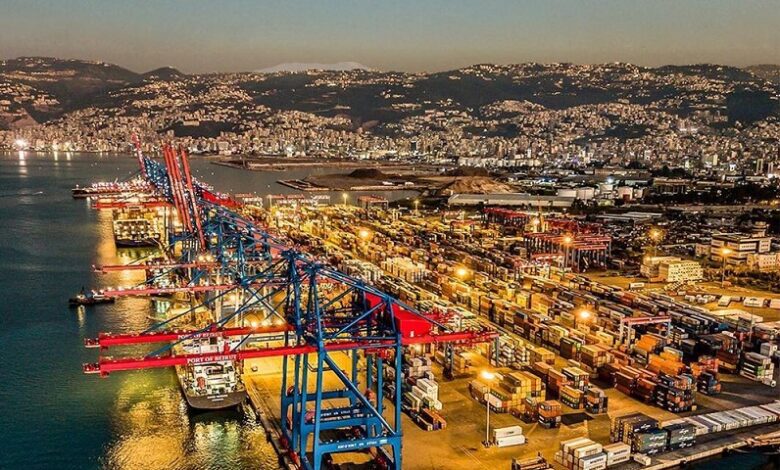يعكس الاجتماع الموسع الذي عقده وزير الأشغال علي حميه في مكتبه أول من أمس، في حضور مسؤولين في المرفأ والمطار والجمارك، وممثلين لشركات شحن ومستوردين، الصورة التاريخية للدولة اللبنانية ومؤسساتها، الموسومة باللامبالاة أمام مصالح الناس والخزينة، وتقاعس مسؤوليها، وخصوصا في الأزمات الوطنية والحالات الاستثنائية الكبرى. أين الدولة؟ ولمَ يتكدّس في مرفأ بيروت وحده نحو 6600 مستوعب حاليا؟ ولماذا لا يتابع موظفو الوزارات المختصة مهماتهم الحيوية لتسهيل إخراج البضائع والمستوردات، وخصوصا المواد الغذائية؟
يعي الجميع الظروف الأمنية والاجتماعية التي يكابدها موظفو القطاع العام، أسوة بغالبية الشعب اللبناني، إلا أن مصادر متابعة تؤكد أن “لا حجة أو عذر أمام الأمن الغذائي والاجتماعي للبنانيين. ولا تبرير مسموحا مهما أسند بالظروف الأمنية، لإبقاء مستوعبات المواد الغذائية والاستهلاكية مكدسة في المرافئ، وتعليق إخراجها، بسبب البيروقراطية المقيتة في مؤسسات الدولة، وعدم اكتراث موظف من هنا أو مدير من هناك لثقل ما يجري، وما قد يستتبعه”.
فهل من خطة طارئة لإخراج البضائع من المرافىء فيما البلاد تعيش حال طوارىء فرضتها الاعتداءات الإسرائيلية عليها؟
اجتماعات للمعالجة؟
بناء على توصية من رئيس مجلس الوزراء نجيب ميقاتي لجميع المعنيين بالمرافق الجوية والبحرية من مطار رفيق الحريري الدولي ومرفأي بيروت وطرابلس وكل المرافىء، عقد الوزير حميه اجتماعا في حضور رئاسة المجلس الأعلى للجمارك والمديرية العامة للجمارك والمعنيين من القطاع الخاص وخصوصا مستوردي المواد الغذائية ومخلصي البضائع والوكلاء البحريين ووسطاء النقل وشركات الشحن الخاصة المعنية بالشؤون البحرية والجوية، وكان بحث في سبل التعجيل في إخراج البضائع وخصوصا تلك التي تمس حياة الناس يوميا، والتعاون مع الأجهزة العاملة في كل المرافق اللبنانية البحرية والجوية.
وقد وعد حميه بعرض هواجس المجتمعين على مجلس الوزراء، وخصوصا في ما يتعلق بالوزارات المعنية، لاتخاذ القرارات المناسبة. فالهدف الأساسي وفق ما قال “الإسراع في إخراج البضائع من المرافق الجوية والبحرية التي تعمل بجميع موظفيها على كامل الأراضي اللبنانية”. وأكد لـ”النهار” أنه تواصل مع الوزارات المعنية، على أن يطرح الموضوع في جلسة مجلس الوزارء اليوم، “بعد أن نضع الإخراج المناسب له وخصوصا بالنسبة إلى آلية عمل الوزارات المعنية مع الجمارك”.
ماذا عن وتيرة العمل في مرفأ بيروت؟ المدير العام للمرفأ عمر عيتاني أكد لـ”النهار” أن “إدارة المرفأ قادرة حتى اليوم على تلبية كل الخدمات والحاجات”، موضحا أن “عمليات الاستيراد والتصدير كما وتيرة العمل لا تزال طبيعية جدا. وبدأنا الآن التعجيل في إخراج السلع والبضائع من المرفأ بالتعاون مع الوزارات المعنية”.
وفي السياق، أشار إلى اجتماع عقد الأسبوع الماضي مع غرفة التجارة والصناعة والهيئات الاقتصادية، وتم الاتفاق على تسريع وتيرة العمل لإخراج البضائع، على أن يصار إلى تخزينها في مستودعاتهم في المرفأ. كذلك عُقد اجتماع في هذا الإطار مع الجهات المعنية التي يصب دورها في إطار تسهيل عمليات إخراج البضائع بالتنسيق مع الوزارات المعنية، على أمل أن يصدر قرار في هذا الإطار عن الحكومة لحض الوزارات على تأمين المداومة في إداراتها، وخصوصا تلك التي لديها مندوبون تناط بهم عملية منح تأشيرات في المرفأ، كوزارات الزراعة والاقتصاد والصحة والصناعة والبيئة”.
هل من خطة في هذا السياق؟ أجاب عيتاني بأن “إدارة المرفأ كما كل القطاعات المعنية في انتظار ما سيصدر عن الحكومة في هذا الإطار”، مؤكدا أن “المرفأ مرفق اقتصادي يعمل بكل مسؤولية على تأمين حاجات البلد”.
حاليا ثمة 6600 مستوعب في مرفأ بيروت، في انتظار الانتهاء من الإجراءات اللازمة لتسليمها إلى أصحابها من المستوردين والتجار. هذا الرقم، وإن يكن عاديا، إلا أنه يعكس الحركة الطبيعية للاستيراد في لبنان في الأيام الطبيعية، لكنه غير مقبول في ظروف استثنائية يعيشها لبنان.
وأشار رئيس نقابة مستوردي المواد الغذائية هاني بحصلي لـ”النهار” إلى أن “البيروقراطية المعتادة يمكن أن نتقبلها في الأيام العادية، أما في ظل هذه الأوضاع فعلى الجميع التعاون لتسهيل إخراج البضائع المكدسة في المرفأ”.
أين تكمن المشكلة؟ أوضح بحصلي أن “المشكلة ليست في الإجراءات المطلوبة من الجمارك أو إدارة المرفأ، بل في الوزارات المعنية ومراكز الفحوص والمختبرات على خلفية النقص في الموظفين ودوام عملهم الذي يقتصر على أيام محددة في الأسبوع”.
وأوضح أن الآلية والإجراءات لإخراج البضائع من البواخر وصولا إلى إجراء الفحوص وتسليمها إلى التاجر كانت تتطلب في الأيام العادية نحو 5 أيام، أما حاليا فتستغرق بين أسبوع وأسبوعين، وهذا غير مقبول”، لافتا إلى أن “الوقت غير مناسب حاليا للبيروقراطية المعتادة، وتاليا يجب اختصار الإجراءات. أما الحلقة الأضعف فتتعلق بعدم نزول عدد أكبر من موظفي الوزارات المعنية إلى العمل يوميا، في حين أن المطلوب أن يداوم هؤلاء سبعة أيام في الأسبوع لتعجيل وتيرة العمل وخصوصا في المختبرات، مع تحديد مهلة يومين على الأكثر لصدور النتائج، على أن يُعطوا كامل حقوقهم والحوافز التي يستحقونها. كذلك، يمكن اختصار الفحوص المطلوبة، إذ ليس من الضروري إجراء فحوص كل مرة لشحنات البضائع المعروفة المصدر وخصوصا من الشركات العالمية، فليكن الفحص انتقائيا أو أقله مرة واحدة لكل أربع شحنات من النوعية والمصدر عينهما”.
وطمأن بحصلي إلى أن “لا نقص في المواد الغذائية وهي متوافرة كالمعتاد، وكذلك بالنسبة إلى موضوع الاستيراد حيث يقوم التجار بطلب بضائعهم”.
المصدر: سلوى بعلبكي – النهار
**Goods Piled Up at the Port as Ministries Hide Behind Bureaucracy**
A broad meeting held two days ago by Public Works Minister Ali Hamieh in his office, attended by officials from the port, airport, customs, and representatives of shipping companies and importers, reflects the long-standing image of the Lebanese state. The meeting showcased the state’s indifference towards the interests of its citizens and treasury, particularly in times of national crises and exceptional circumstances. Why is the state absent? And why are approximately 6,600 containers currently stuck at Beirut Port? Why aren't ministry officials fulfilling their vital tasks, especially in facilitating the release of essential goods like food supplies?
While everyone is aware of the difficult security and social conditions faced by public sector employees, much like the rest of the Lebanese population, sources following the issue stress that “there is no excuse when it comes to Lebanon’s food security. The bureaucracy that keeps vital food and consumer goods trapped in the ports is unacceptable, regardless of the current security challenges.”
Is there an emergency plan to release goods from the ports as the country faces the emergency imposed by Israeli attacks?
### Meetings for a Solution?
Following a recommendation by Prime Minister Najib Mikati to all relevant entities managing air and sea ports, including Beirut and Tripoli ports, Minister Hamieh held a meeting with the Supreme Customs Council, the General Directorate of Customs, and private sector representatives, including food importers, cargo brokers, shipping agents, and transportation intermediaries. The meeting discussed ways to expedite the release of goods, especially those essential for daily life, while coordinating with the relevant authorities at all Lebanese sea and air ports.
Minister Hamieh promised to present the concerns raised during the meeting to the Council of Ministers, particularly those related to the involved ministries, in order to take the necessary decisions. The primary goal, according to Hamieh, is to “speed up the release of goods from air and sea ports that are operating with full staff across Lebanese territories.” He also confirmed to “An-Nahar” that he had communicated with the relevant ministries and would raise the matter at today’s cabinet session, aiming to establish a proper framework for the ministries’ work with customs.
### Port of Beirut Operations
As for the pace of operations at Beirut Port, Director-General Omar Itani confirmed to “An-Nahar” that “the port's administration is still able to meet all needs and services.” He clarified that import and export operations, as well as the overall work pace, are still running normally. “We have started to accelerate the release of goods in cooperation with the concerned ministries,” Itani said.
He also referred to a meeting held last week with the Chamber of Commerce and Industry and economic bodies, where it was agreed to speed up the release of goods and store them in their respective warehouses at the port. Another meeting was held with stakeholders involved in facilitating the release of goods, and it is hoped that a government decision will soon be issued urging the ministries to ensure continuous work in their departments, especially those with delegates responsible for granting port clearances, such as the Ministries of Agriculture, Economy, Health, Industry, and Environment.
When asked about a plan for this process, Itani replied, “The port administration and all relevant sectors are awaiting a government decision on this matter.” He emphasized that the port is an essential economic facility working responsibly to meet the country's needs.
Currently, there are 6,600 containers at Beirut Port awaiting the necessary procedures to be handed over to importers and traders. While this number is considered typical under normal circumstances, it is unacceptable under the exceptional conditions Lebanon is experiencing.
### The Role of Bureaucracy
Hani Bahsali, head of the Food Importers Syndicate, explained to “An-Nahar” that “the usual bureaucracy might be tolerable under normal conditions, but given the current situation, everyone must cooperate to facilitate the release of the accumulated goods at the port.”
Where does the problem lie? Bahsali explained that “the issue is not with customs or port management but with the relevant ministries and testing laboratories. The problem arises from a shortage of employees and their limited working hours, which are restricted to certain days of the week.”
The usual process for releasing goods from ships, conducting tests, and delivering them to traders used to take about five days in normal times. Now, however, it takes between one and two weeks, which is unacceptable. Bahsali emphasized that now is not the time for the usual bureaucracy, and procedures must be streamlined. The weakest link is the insufficient number of ministry employees reporting to work daily. These employees need to work seven days a week to accelerate the pace, especially in the laboratories, where results should be provided within two days at most. They must be given all their rights and incentives. Additionally, it is unnecessary to conduct tests on every shipment, particularly those from well-known global companies. Testing can be selective or done once for every four shipments of the same type and source.
Bahsali reassured that there is no shortage of food products, which are available as usual. Traders are continuing to place orders to ensure supply.
Translated by economyscopes team
 سكوبات عالمية إقتصادية – EconomyScopes إجعل موقعنا خيارك ومصدرك الأنسب للأخبار الإقتصادية المحلية والعربية والعالمية على أنواعها بالإضافة الى نشر مجموعة لا بأس بها من فرص العمل في لبنان والشرق الأوسط والعالم
سكوبات عالمية إقتصادية – EconomyScopes إجعل موقعنا خيارك ومصدرك الأنسب للأخبار الإقتصادية المحلية والعربية والعالمية على أنواعها بالإضافة الى نشر مجموعة لا بأس بها من فرص العمل في لبنان والشرق الأوسط والعالم




